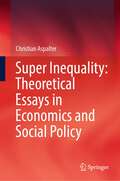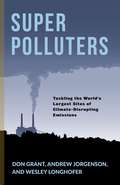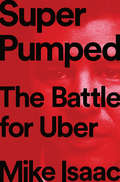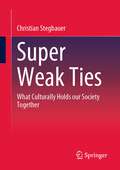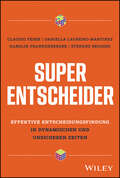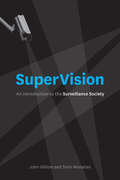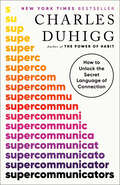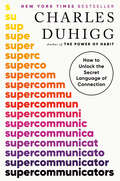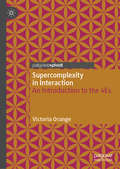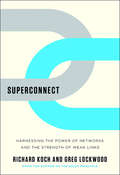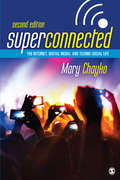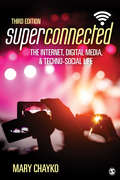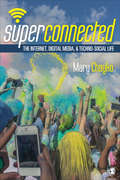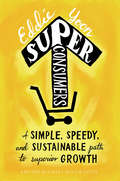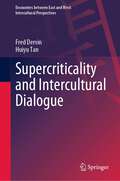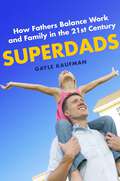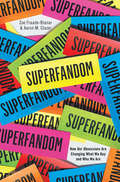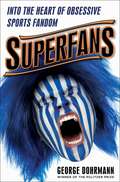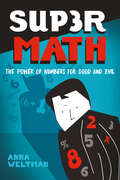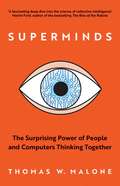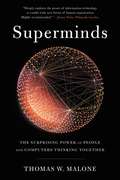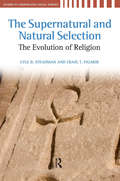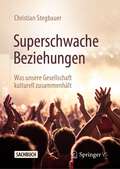- Table View
- List View
Super Inequality: Theoretical Essays in Economics and Social Policy
by Christian AspalterThis book bridges the disciplines of micro-economics and social policy in general, and, in particular, behavioral/explanatory social policy and public choice theory, plus Leibenstein’s X-efficiency theory. Being trained as an economist and social policy scientist, the author leaps out of the comfort zone of most social policy scientists and experts, right into the exciting world of micro-economic theory, and then extending and connecting those theories to explain major social, political and economic conundrums of our time. In doing so, the book offers a new set of theoretical—and practical—explanations derived from the general proposition of micro-economic theory, of how government officers, policymakers, administrators and the people themselves alike are, by and large, motivated in their daily as well as strategic (long-term) decision-making. Using a meta-analytical approach (based on a number of grand theories), this book also explains systemic factors behind human behavior and the thereof resulting shortcomings in lifetime outcomes (health, wealth and happiness of a person) and at the same time societal, policy-making, and economic outcomes on societal level, and in global comparison.The outcomes thereof can be measured exactly (and hence validated), especially through the method of empirical comparative social science/economic research. Here, the author also (but not only) introduces the new method of using Aspalter's Standardized Relative Performance (SRP) Index in measuring exactly complex, aggregate performances of multiple governments, and that at the same time also across the entire world.
Super Polluters: Tackling the World’s Largest Sites of Climate-Disrupting Emissions (Society and the Environment)
by Wesley Longhofer Don Grant Andrew JorgensonPower plants are essential to achieving the standard of living that modern societies demand and the social and economic infrastructure on which they depend. Yet their indispensability has allowed them to evade responsibility for their vast carbon emissions. Fossil-fueled power plants are the single largest sites of anthropogenic greenhouse gases, making them one of the greatest threats to our planet’s climate. Significant as they are, we lack a comprehensive understanding of the social causes that enable power plant emissions and continue to delay their reduction.Super Polluters offers a groundbreaking global analysis of carbon pollution caused by the generation of electricity, pinpointing who bears the most responsibility for the energy sector’s vast emissions and what can be done about them. The sociologists Don Grant, Andrew Jorgenson, and Wesley Longhofer analyze a novel dataset on the carbon dioxide emissions and structural attributes of thousands of fossil-fueled power plants around the world, identifying which plants discharge the most carbon. They investigate the global, organizational, and political conditions that explain these hyper-emitting facilities’ behavior and call into question the claim that improvements in technical efficiency will always reduce emissions. Grant, Jorgenson, and Longhofer demonstrate which energy and climate policies are most effective at abating power-plant pollution, emphasizing how mobilized citizen activism shapes those outcomes. A comprehensive account of who bears the blame for our warming planet, Super Polluters points to more feasible and effective emission reduction strategies that target the world’s most profligate polluters.
Super Pumped: The Battle For Uber
by Mike IsaacA New York Times technology correspondent presents the dramatic story of Uber, the Silicon Valley startup at the center of one of the great venture capital power struggles of our time. <P><P>In June 2017, Travis Kalanick, the hard-charging CEO of Uber, was ousted in a boardroom coup that capped a brutal year for the transportation giant. Uber had catapulted to the top of the tech world, yet for many came to symbolize everything wrong with Silicon Valley. <P><P>Award-winning New York Times technology correspondent Mike Isaac’s Super Pumped presents the dramatic rise and fall of Uber, set against an era of rapid upheaval in Silicon Valley. Backed by billions in venture capital dollars and led by a brash and ambitious founder, Uber promised to revolutionize the way we move people and goods through the world. A near instant “unicorn,” Uber seemed poised to take its place next to Amazon, Apple, and Google as a technology giant. <P><P>What followed would become a corporate cautionary tale about the perils of startup culture and a vivid example of how blind worship of startup founders can go wildly wrong. Isaac recounts Uber’s pitched battles with taxi unions and drivers, the company’s toxic internal culture, and the bare-knuckle tactics it devised to overcome obstacles in its quest for dominance. With billions of dollars at stake, Isaac shows how venture capitalists asserted their power and seized control of the startup as it fought its way toward its fateful IPO. <P><P>Based on hundreds of interviews with current and former Uber employees, along with previously unpublished documents, Super Pumped is a page-turning story of ambition and deception, obscene wealth, and bad behavior that explores how blistering technological and financial innovation culminated in one of the most catastrophic twelve-month periods in American corporate history. <P><P><b> A New York Times Bestseller </b>
Super Weak Ties: What Culturally Holds our Society Together
by Christian StegbauerIn this book, it is explained how we learn from each other and how people adapt their behavior to one another. We orient ourselves to others by observing how they behave in specific situations. The analysis of relationships is actually the domain of network research, which has traditionally focused on strong and weak ties. However, this book explores super weak ties, which are often not consciously perceived, as their significance unfolds behind the backs of us all. Although one can hardly speak of relationships in the traditional sense, these super weak ties are often just as influential as stronger ones. The orienting effect is particularly pronounced when there are similarities in interests and situations between observers and those being observed. Without transmissions facilitated by super weak ties, it would be challenging to arrive at cultural commonalities in society.
Super-Entscheider: Effektive Entscheidungsfindung in dynamischen und unsicheren Zeiten
by Claudio Feser Karolin Frankenberger Stefano Brusoni Daniella Laureiro-MartinezVerbessern Sie die Entscheidungen, die Sie tagtäglich treffen, mithilfe neuester neurowissenschaftlicher Erkenntnisse drastisch! Täglich treffen wir Hunderte von Entscheidungen, von kleinen - wie die Frage, was wir heute anziehen und wie wir zur Arbeit fahren - bis hin zu großen - wie die Unternehmensstrategie und die Frage, ob ein Umstrukturierungsprogramm eingeleitet werden soll, das sich auf Tausende von Menschen auswirken kann. Studien zufolge verbringen Führungskräfte 40 Prozent ihrer Zeit damit, Entscheidungen zu treffen und die Wirksamkeit ihrer Entscheidungen bestimmt weitgehend die Ergebnisse der von ihnen geführten Unternehmen. In diesem Buch liefert ein Team renommierter Forscher und Unternehmensberater eine Anwendung der neuesten neurowissenschaftlichen Erkenntnisse, um die schwierigsten Entscheidungen effektiv zu treffen - nämlich diejenigen, die wir in dynamischen Umgebungen treffen, in Situationen der Ungewissheit, wenn wir Ergebnisse vorhersagen müssen, uns aber relevante Informationen fehlen, die Zeit knapp ist und sich die Umgebung ständig verändert. Das Buch ist in drei Teile gegliedert. Im ersten Teil bietet es einen praktischen Rahmen für effektive Entscheidungen unter Unsicherheit. Im zweiten Teil des Buches werden Ansätze zur effektiven Umsetzung dieser Entscheidungen erörtert, so dass der Wandel auf allen Ebenen, vom Einzelnen bis zur Organisation, bewältigt werden kann. Schließlich enthält das Buch Vorschläge, wie Führungskräfte die für die Entscheidungsfindung relevanten kognitiven Fähigkeiten bei sich selbst und bei ihren Mitarbeitern analysieren und verbessern können.
SuperVision: An Introduction to the Surveillance Society
by John Gilliom Torin MonahanWe live in a surveillance society. Anyone who uses a credit card, cell phone, or even search engines to navigate the Web is being monitored and assessed—and often in ways that are imperceptible to us. The first general introduction to the growing field of surveillance studies, SuperVision uses examples drawn from everyday technologies to show how surveillance is used, who is using it, and how it affects our world. Beginning with a look at the activities and technologies that connect most people to the surveillance matrix, from identification cards to GPS devices in our cars to Facebook, John Gilliom and Torin Monahan invite readers to critically explore surveillance as it relates to issues of law, power, freedom, and inequality. Even if you avoid using credit cards and stay off Facebook, they show, going to work or school inevitably embeds you in surveillance relationships. Finally, they discuss the more obvious forms of surveillance, including the security systems used at airports and on city streets, which both epitomize contemporary surveillance and make impossibly grand promises of safety and security. Gilliom and Monahan are among the foremost experts on surveillance and society, and, with SuperVision, they offer an immensely accessible and engaging guide, giving readers the tools to understand and to question how deeply surveillance has been woven into the fabric of our everyday lives.
Supercommunicators: How to Unlock the Secret Language of Connection
by Charles DuhiggFrom the Globe and Mail and New York Times bestselling author of The Power of Habit, an investigation of what makes conversations work, and how we can all learn to be supercommunicators at work and in our lives.We all know people who seem capable of connecting with almost anyone. They are the ones we turn to for advice, the ones who ask deep questions but who also seem to hear what we are trying to say. What do they know about conversation that makes them so special? And what can they tell us about how communication really works?Supercommunicators, Charles Duhigg argues, understand—some by intuition, some by hard-won experience—that there is a science to how human beings connect through words. They understand that whenever we speak, we're actually participating in three distinct conversations: What is this really about? How do we feel? And who are we? They know the importance of recognizing—and then matching—each kind of conversation, and how to hear the complex emotions, subtle negotiations and hidden beliefs that color and inform everything we say. Our pasts, our values, our affiliations—our identities—shape every discussion we have, from who will pick up the kids to how we want to be treated at work.With his trademark insight and clarity, Duhigg shows readers how to recognize these three conversations—and teaches us the skills we need to navigate them more successfully. Communication, he argues, is a superpower. By bringing readers into jury deliberations and fraught CIA recruitments, into Netflix's company-wide conversations about equity and the writers' room of The Big Bang Theory, we learn why some people are able to make themselves heard—and to hear others—so clearly. We learn how to recognize and leverage the hidden layers that lurk beneath every conversation. In the end, we learn a simple but powerful lesson: We can connect with anyone, as long as we understand how conversations work.
Supercommunicators: How to Unlock the Secret Language of Connection
by Charles DuhiggNEW YORK TIMES BESTSELLER • From the author of The Power of Habit, a fascinating exploration of what makes conversations work—and how we can all learn to be supercommunicators at work and in life&“A winning combination of stories, studies, and guidance that might well transform the worst communicators you know into some of the best.&”—Adam Grant, author of Think Again and Hidden PotentialONE OF NPR&’S BEST BOOKS OF THE YEAR • FINALIST FOR THE SABEW BEST IN BUSINESS BOOK AWARDCome inside a jury room as one juror leads a starkly divided room to consensus. Join a young CIA officer as he recruits a reluctant foreign agent. And sit with an accomplished surgeon as he tries, and fails, to convince yet another cancer patient to opt for the less risky course of treatment. In Supercommunicators, Charles Duhigg blends deep research and his trademark storytelling skills to show how we can all learn to identify and leverage the hidden layers that lurk beneath every conversation.Communication is a superpower and the best communicators understand that whenever we speak, we&’re actually participating in one of three conversations: practical (What&’s this really about?), emotional (How do we feel?), and social (Who are we?). If you don&’t know what kind of conversation you&’re having, you&’re unlikely to connect. Supercommunicators know the importance of recognizing—and then matching—each kind of conversation, and how to hear the complex emotions, subtle negotiations, and deeply held beliefs that color so much of what we say and how we listen. Our experiences, our values, our emotional lives—and how we see ourselves, and others—shape every discussion, from who will pick up the kids to how we want to be treated at work. In this book, you will learn why some people are able to make themselves heard, and to hear others, so clearly.With his storytelling that takes us from the writers&’ room of The Big Bang Theory to the couches of leading marriage counselors, Duhigg shows readers how to recognize these three conversations—and teaches us the tips and skills we need to navigate them more successfully.In the end, he delivers a simple but powerful lesson: With the right tools, we can connect with anyone.
Supercomplexity in Interaction: An Introduction to the 4Es
by Victoria OrangeThis book aims to explore the supercomplexity of interaction and to suggest ways of teaching about this supercomplexity in various settings, including intercultural communication and language-learning. Using complex systems theory, the author argues that interaction is actually a supercomplex adaptive system which interconnects a number of different complex systems (the 4Es: Expression, Encounter, Education, Emotion) to give it meaning. She then draws on the concept of heartfulness to promote different ways of understanding and teaching the supercomplexity of interaction. This book will be of interest to language educators and students, as well as scholars of intercultural communication.
Superconnect: Harnessing the Power of Networks and the Strength of Weak Links
by Richard Koch Greg LockwoodThe practical guide to discovering the rules of our superconnected world through the science and sociology of networks. In Superconnect, Richard Koch and Greg Lockwood show that success is less about who you are than how you connect--a chance meeting with an old colleague leads to a swanky new job; two businessmen collaborate online and cofound a successful start-up; a friend introduces a promising entrepreneur to a millionaire looking to invest. But why do these lucky breaks always happen to other people? Personal and professional networks shape everything we do, but simply knowing that they exist won't help you harness your connections for maximum success. With an eye toward business applications, Superconnect outlines the new rules of our densely linked society. At the core of the analysis are three simple network components--strong relationships, weak relationships, and hubs--that interact in surprising, counterintuitive ways. Understanding how these components mesh, and connecting unrelated people, is the way to achieve in today's hyper-connected world.
Superconnected: The Internet, Digital Media, And Techno-social Life (Sage Sociological Essentials Ser.)
by Mary ChaykoSuperconnected: The Internet, Digital Media, and Techno-Social Life, Second Edition brings together the latest research from many relevant fields to examine how contemporary social life is mediated by various digital technologies: the internet, social media, and mobile devices. The book explores such topics as how digital technology led to the modern information age, information sharing and surveillance, how digital media shape socialization and development of the self, digital divides that separate groups in society, and the impact of digital media across social institutions. The author’s clear, nontechnical discussions and interdisciplinary synthesis make Superconnected an essential text for any course that examines how social life is affected when information and communication technology enter the picture. Dr. Mary Chayko is a sociologist, Teaching Professor of Communication and Information, and Director of Undergraduate Interdisciplinary Studies at the School of Communication and Information (SC&I) at Rutgers University. For more on the author and for instructor resources, visit her book blog at http://superconnectedblog.com. New to the Edition Current events, the latest statistics and new research findings are reflected throughout the book, including richly-detailed sections on the rise of “fake” news and information, the human-machine relationship, and the history and implications of the “dark web” and the “deep web.” The book’s companion blog, superconnectedblog.com, now includes customizable lecture slides and discussion questions for each chapter. Short podcasts, recorded by the author and posted to her blog, provide fun, unique points of access to every chapter.
Superconnected: The Internet, Digital Media, And Techno-social Life (Sage Sociological Essentials Ser.)
by Mary ChaykoSuperconnected: The Internet, Digital Media, and Techno-Social Life, Second Edition brings together the latest research from many relevant fields to examine how contemporary social life is mediated by various digital technologies: the internet, social media, and mobile devices. The book explores such topics as how digital technology led to the modern information age, information sharing and surveillance, how digital media shape socialization and development of the self, digital divides that separate groups in society, and the impact of digital media across social institutions. The author’s clear, nontechnical discussions and interdisciplinary synthesis make Superconnected an essential text for any course that examines how social life is affected when information and communication technology enter the picture. Dr. Mary Chayko is a sociologist, Teaching Professor of Communication and Information, and Director of Undergraduate Interdisciplinary Studies at the School of Communication and Information (SC&I) at Rutgers University. For more on the author and for instructor resources, visit her book blog at http://superconnectedblog.com. New to the Edition Current events, the latest statistics and new research findings are reflected throughout the book, including richly-detailed sections on the rise of “fake” news and information, the human-machine relationship, and the history and implications of the “dark web” and the “deep web.” The book’s companion blog, superconnectedblog.com, now includes customizable lecture slides and discussion questions for each chapter. Short podcasts, recorded by the author and posted to her blog, provide fun, unique points of access to every chapter.
Superconnected: The Internet, Digital Media, And Techno-social Life (Sage Sociological Essentials Ser.)
by Mary T. ChaykoWhat does it mean to live in a superconnected society? In this new revised, updated edition of Superconnected: The Internet, Digital Media, and Techno-Social Life, Mary Chayko continues to explore how social life is impacted when communication and information technology enters the picture. She provides timely analysis of such critical issues as privacy and surveillance, online harassment and abuse, and dependency and addiction, while examining new trends in social media use, global inequalities and divides, online relating and dating, and the internet of things. The new edition highlights such issues as technology and mental health, digital public policy and law, and the author’s own research on bias and stereotyping in digital environments. Throughout, she considers how individuals, families, communities, organizations, and whole societies are affected. The author’s clear, nontechnical discussions and interdisciplinary synthesis make the third edition of Superconnected an essential text for any course that explores how contemporary life is impacted by the internet, social media, mobile devices, and smart technologies. The text is accompanied by the author′s Superconnected Blog (superconnectedblog.com) which includes lecture slides, discussion questions and assignments, and short podcasts for each chapter that summarize key ideas.
Superconnected: The Internet, Digital Media, And Techno-social Life (Sage Sociological Essentials Ser.)
by Mary T. ChaykoWhat does it mean to live in a superconnected society? In this new revised, updated edition of Superconnected: The Internet, Digital Media, and Techno-Social Life, Mary Chayko continues to explore how social life is impacted when communication and information technology enters the picture. She provides timely analysis of such critical issues as privacy and surveillance, online harassment and abuse, and dependency and addiction, while examining new trends in social media use, global inequalities and divides, online relating and dating, and the internet of things. The new edition highlights such issues as technology and mental health, digital public policy and law, and the author’s own research on bias and stereotyping in digital environments. Throughout, she considers how individuals, families, communities, organizations, and whole societies are affected. The author’s clear, nontechnical discussions and interdisciplinary synthesis make the third edition of Superconnected an essential text for any course that explores how contemporary life is impacted by the internet, social media, mobile devices, and smart technologies. The text is accompanied by the author′s Superconnected Blog (superconnectedblog.com) which includes lecture slides, discussion questions and assignments, and short podcasts for each chapter that summarize key ideas.
Superconnected: The Internet, Digital Media, and Techno-Social Life
by Mary ChaykoWhat does it mean to live in a superconnected society? Superconnected: The Internet, Digital Media, and Techno-Social Life brings together insights about digital technology and society from the many literatures in which author Mary Chayko is immersed: sociology, communication, psychology, media and technology studies. The result is a groundbreaking analysis of contemporary social life as it is influenced by the internet, social media, and mobile devices. Individual chapters explore topics such as how digital technology helped to shape the modern information age; information sharing and surveillance; digital socialization and development of the self; digital inequalities; global impacts; and the impact of the internet and digital media across social institutions. The author's interdisciplinary synthesis makes Superconnected an essential text for courses in all departments that examine how social life is affected when information and communication technology enter the picture. Her clear, non-technical prose also makes Superconnected a great choice for general readers who are interested in this topic as well. Dr. Mary Chayko is a sociologist, professor of communication and information, and director of undergraduate interdisciplinary studies at Rutgers University's School of Communication and Information. For more on the author, visit her blog athttp://marychayko.com/
Superconsumers: A Simple, Speedy, and Sustainable Path to Superior Growth
by Eddie YoonPork dorks. Craftsters. American Girl fans. Despite their different tastes, these eclectic diehards have a lot in common: they're obsessed about a specific brand, product, or category. They pursue their passions with fervor, and they're extremely knowledgeable about the things they love. They aren't average consumers-they're superconsumers.Although small in number, superconsumers can have an outsized impact on a company's bottom line. Representing 10% of total consumers, they can drive between 30% to 70% of sales, and they're usually willing to spend considerably more than the average consumer. And because they're so engaged and passionate, they can offer invaluable advice to managers looking to improve their products, change their business models, energize their cultures, and attract new customers.In Superconsumers, growth strategy expert Eddie Yoon lays out a simple but extremely effective framework that has helped companies of all types and sizes achieve more sustainable growth: he'll show you how to find, listen to, and engage with your most passionate and profitable consumers, and then tailor your decisions to meet their wants and needs. Along the way, he'll let you into the minds and homes of superconsumers of all kinds, revealing what makes them tick and why they're willing to spend so much more than other consumers.Rich with data and case studies of companies that have implemented superconsumer strategies with great success, Superconsumers is a fun, practical, and inspiring guide for anyone interested in making their best customers even better.
Supercriticality and Intercultural Dialogue (Encounters between East and West)
by Fred Dervin Huiyu TanThis book offers a snapshot of interculturality as a complex, unstable and highly political object of research and education when it locates at the centre of multifaceted dialogues between teachers and students; students and students; teachers, students, scholars and readers. The context of the book is a Chinese course on intercultural communication education where students engage with local and international teachers. By listening to the intriguing and stimulating voices of these students in dialogue with the teachers, the reader also has the opportunity to enter the intercultural world of Chinese youth, beyond stereotypes. The unique approach proposed in the book is of interest to students, teachers of intercultural communication education, teacher educators, researchers and anyone wishing to build up supercriticality in relation to the fascinating notion of interculturality. The book contains 15 chapters and revolves around five main dialogues between the students and their teachers. Following each dialogue, the floor is given to the students to react to the dialogues and to share their views on questions that emerged from the main dialogues. The book conveys the authors’ excitement about approaching interculturality in supercritical ways, engaging in the process with multiple voices.
Superdads: How Fathers Balance Work and Family in the 21st Century
by Gayle Kaufman“Look! There in the playground -- with the stroller and diaper bag! It's Superdad! Yes, it's Superdad—the most involved fathers in American history. And with this careful, compassionate and also critical group portrait, Gayle Kaufman has finally told their story. If you think men aren't changing—or if you think they somehow get neutered if they are changing—you need to read this book.”—Michael Kimmel, author of Guyland In an age when fathers are spending more time with their children than at any other point in the past, men are also facing unprecedented levels of work-family conflict. How do fathers balance their two most important roles—that of father and that of worker? In Superdads, Gayle Kaufman captures the real voices of fathers themselves as they talk about their struggles with balancing work and family life. Through in-depth interviews with a diverse group of men, Kaufman introduces the concept of “superdads”, a group of fathers who stand out by making significant changes to their work lives in order to accommodate their families. They are nothing like their fathers, “old dads” who focus on their traditional role as breadwinner, or even some of their peers, so-called “new dads” who work around the increasing demands of their paternal roles without really bucking the system. In taking their family life in a completely new direction, these superdads challenge the way we think about long-held assumptions about men’s role in the family unit. Thought-provoking and heartfelt, Superdads provides an overview of an emerging trend in fatherhood and the policy solutions that may help support its growth, pointing the way toward a future society with a more feasible approach to the work-family divide.
Superfandom: How Our Obsessions are Changing What We Buy and Who We Are
by Aaron M. Glazer Zoe Fraade-BlanarAn in-depth look at the influence of fans—society’s alpha consumers—on our lives and culture. As fandom sheds its longtime stigmas of geekiness and hysteria, fans are demanding more from the celebrities and brands they love. Digital tools have given organizations—from traditional businesses to tech startups—direct, real-time access to their most devoted consumers, and it’s easy to forget that this access flows both ways. This is the new “fandom-based economy”: a convergence of brand owner and brand consumer. Fan pressures hold more clout than ever before as audiences demand a say in shaping the future of the things they love. In Superfandom, Zoe Fraade-Blanar and Aaron M. Glazer explain this new era of symbiosis. For producers, it can mean a golden opportunity: brands such as Polaroid and Surge, preserved by the passion of a handful of nostalgic fans, can now count on an articulate, creative, and, above all, loyal audience. Yet, the new economy has its own risks—it’s also easier than ever for companies to lose their audience’s trust, as Valve did when it tried to introduce a paid mod system for its Skyrim video game. Examining key cases that span a wide range of consumer markets, Fraade-Blanar and Glazer explain why some kinds of engagement with fans succeed and some backfire. Throughout, the authors probe fandom’s history, sociology, and psychology. From the nineteenth-century American Alice Drake, who bribed her way into the houses of her favorite European composers, to Hatsune Miku, the Japanese virtual celebrity whose songs are composed entirely by fans, the dynamics of fandom—the activities we perform to show we belong to a group of people with common interests—may be as old as culture itself. For groupies of financier Warren Buffet and enthusiasts of Cards Against Humanity alike, the consumer relationship has been transformed. Superfandom is an essential guide for those who care about, contribute to, and live in our rapidly expanding fan-driven economy.
Superfans: Into the Heart of Obsessive Sports Fandom
by George DohrmannA Pulitzer Prize–winning journalist pulls back the curtain on the extraordinary inner lives of America’s most obsessive sports fans. There are fans, and then there are fanatics. In this wondrously immersive look at American sports fandom, George Dohrmann travels the country to find out what distinguishes an ordinary, everyday enthusiast from that special breed of supporter known as the superfan. In Minnesota, Dohrmann meets newly minted generals of the Viking World Order, a Minnesota Vikings affinity group organized along military lines. In Oregon, he shares a few beers with a determined soccer fan who amassed—almost singlehandedly—a four-thousand-strong cheering section for the fledgling Portland Timbers. In Illinois, he talks with the parents of a five-year-old boy whose intense hatred of Tom Brady went viral on YouTube. Through these and other intimate profiles, Dohrmann shows us the human faces behind the colored face paint, the real people inside the elaborate costumes who prowl the stands and parking lots at stadiums from coast to coast. In addition to the fans themselves, Dohrmann also talks with the experts who study them. He uses the latest thinking in sports psychology—some of it learned during a spirited round of miniature golf with a group of professors at the annual Sports Psychology Forum—to unravel the answers to such burning questions as: How does fandom begin? What are its effects on everyday life? When does it go too far? For everyone who’s ever body-painted their torso with the team colors of their alma mater before heading off to a sports bar—or even just screamed at their television during the NBA Finals—Superfans offers an entertaining and insightful exploration of the many ways human beings find meaning in something bigger than themselves.Advance praise for Superfans “A thought-provoking exploration of the weird, fascinating, and wonderful world of sports fans.”—Chris Ballard, senior writer at Sports Illustrated “Superfans is utterly hilarious, showing that sports have the power to turn PhD psychologists into superstitious obsessives, and young children into statistical savants. It’s also the definitive anthropological dive into a form of mania that affects someone you love, if not you yourself.”—David Epstein, New York Times bestselling author of The Sports Gene
Supermath: The Power of Numbers for Good and Evil
by Anna WeltmanExplore the hidden powers of math that shape us, influencing everything from our sense of justice to our perception of beauty.Archaeologists decoding ancient messages. Epidemiologists analyzing the spread of a contagious disease. African Americans seeking full enfranchisement in a society that has worked to exclude them. A family doing puzzles at the kitchen table. These scenarios seem to have little in common. But in fact, each of these groups is faced with a multifaceted challenge—and each is using math to solve it.In Supermath, popular author and educator Anna Weltman showcases the incredible power of mathematics when people apply it outside of the world of pure numbers, introducing it into the realms of science, politics, history, education, and art. Her stories share how math has protected us from war and disease, helped us communicate across time and space, and made the world a fairer and more beautiful place. But Weltman also warns us that dangers arise when the transformative might of numbers goes unchecked. Mathematics has been used to mistranslate records, silence indigenous communities, create gerrymandered voting districts, close the gates of higher education. Sometimes, math can blind those who wield it to its limitations, causing those who would deploy it to solve problems to instead create more. Drawing on history and current events, Weltman tackles five fascinating questions: Is math the universal language? Can math eliminate bias? Can math predict the next move? Can math open doors? And finally, What is genuine beauty? Supermath is an enlightening book that pursues complex lines of mathematical thought while providing a fascinating lens into global problems and human culture as a whole.
Superminds: How Hyperconnectivity is Changing the Way We Solve Problems
by Thomas W. MaloneIs Apple conscious? Could a cyber–human system sense a potential terrorist attack? Or make diagnosing a rare and little-known disease routine? Computers are not replacing us: they are enhancing us. Different intelligences are joining together to do things we thought were impossible. Whether it&’s devising innovations to tackle climate change, helping job seekers and employers find one another, or identifying the outbreak of a serious disease, groups of humans and machines are already working together to solve all sorts of problems. And they will do a lot more. The future will be like another world – a place where we&’ll think differently. In many ways, we are already there.
Superminds: The Surprising Power of People and Computers Thinking Together
by Thomas W. MaloneFrom the founding director of the MIT Center for Collective Intelligence comes a fascinating look at the remarkable capacity for intelligence exhibited by groups of people and computers working together. If you're like most people, you probably believe that humans are the most intelligent animals on our planet. But there's another kind of entity that can be far smarter: groups of people. In this groundbreaking book, Thomas Malone, the founding director of the MIT Center for Collective Intelligence, shows how groups of people working together in superminds -- like hierarchies, markets, democracies, and communities -- have been responsible for almost all human achievements in business, government, science, and beyond. And these collectively intelligent human groups are about to get much smarter. Using dozens of striking examples and case studies, Malone shows how computers can help create more intelligent superminds simply by connecting humans to one another in a variety of rich, new ways. And although it will probably happen more gradually than many people expect, artificially intelligent computers will amplify the power of these superminds by doing increasingly complex kinds of thinking. Together, these changes will have far-reaching implications for everything from the way we buy groceries and plan business strategies to how we respond to climate change, and even for democracy itself. By understanding how these collectively intelligent groups work, we can learn how to harness their genius to achieve our human goals. Drawing on cutting-edge science and insights from a remarkable range of disciplines, Superminds articulates a bold -- and utterly fascinating -- picture of the future that will change the ways you work and live, both with other people and with computers.
Supernatural and Natural Selection: Religion and Evolutionary Success
by Lyle B. Steadman Craig T. PalmerSpanning many different epochs and varieties of religious experience, this book develops a new approach to religion and its role in human history. The authors look across a range of religious phenomena-from ancestor worship to totemism, shamanism, and worldwide modern religions-to offer a new explanation of the evolutionary success of religious behaviors. Their book is more empirical and verifiable than most previous books on evolution and religion because they develop an approach that removes guesswork about beliefs in the supernatural, focusing instead on the behaviors of individuals. The result is a pioneering look at how and why natural selection has favored religious behaviors throughout history.
Superschwache Beziehungen: Was unsere Gesellschaft kulturell zusammenhält
by Christian StegbauerIn diesem Buch wird erklärt, wie wir voneinander lernen und wie die Menschen sich im Verhalten aneinander anpassen. Wir orientieren uns an anderen, indem wir beobachten, wie sich diese in bestimmten Situationen verhalten. Die Analyse von Beziehungen ist eigentlich das Metier der Netzwerkforschung. Dort werden bislang nur starke und schwache Beziehungen behandelt. Hier geht es aber um superschwache Beziehungen. Diese nehmen wir oft gar nicht wahr, denn deren Bedeutung entfaltet sich hinter dem Rücken von uns allen. Obwohl man kaum von Beziehungen im traditionellen Sinne sprechen kann, sind diese oft genauso wirksam wie stärkere Beziehungen. Die Orientierungswirkung entfaltet sich dann besonders gut, wenn Ähnlichkeiten hinsichtlich der Interessen und der Lage zwischen Beobachtern und Beobachteten bestehen. Ohne Übertragungen mit Hilfe von superschwachen Beziehungen fiele es schwer, zu kulturellen Gemeinsamkeiten in der Gesellschaft zu kommen.
